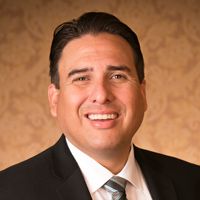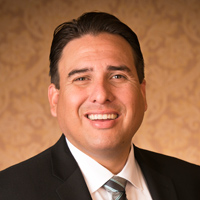High Earners and Successful Savers: What Is Your Tax Plan for the Future?
We’re experiencing historically low tax rates right now, so what can you do to plan ahead? In the near future, tax planning could become the most important part of your financial plan.


Profit and prosper with the best of Kiplinger's advice on investing, taxes, retirement, personal finance and much more. Delivered daily. Enter your email in the box and click Sign Me Up.
You are now subscribed
Your newsletter sign-up was successful
Want to add more newsletters?

Delivered daily
Kiplinger Today
Profit and prosper with the best of Kiplinger's advice on investing, taxes, retirement, personal finance and much more delivered daily. Smart money moves start here.

Sent five days a week
Kiplinger A Step Ahead
Get practical help to make better financial decisions in your everyday life, from spending to savings on top deals.

Delivered daily
Kiplinger Closing Bell
Get today's biggest financial and investing headlines delivered to your inbox every day the U.S. stock market is open.

Sent twice a week
Kiplinger Adviser Intel
Financial pros across the country share best practices and fresh tactics to preserve and grow your wealth.

Delivered weekly
Kiplinger Tax Tips
Trim your federal and state tax bills with practical tax-planning and tax-cutting strategies.

Sent twice a week
Kiplinger Retirement Tips
Your twice-a-week guide to planning and enjoying a financially secure and richly rewarding retirement

Sent bimonthly.
Kiplinger Adviser Angle
Insights for advisers, wealth managers and other financial professionals.

Sent twice a week
Kiplinger Investing Weekly
Your twice-a-week roundup of promising stocks, funds, companies and industries you should consider, ones you should avoid, and why.

Sent weekly for six weeks
Kiplinger Invest for Retirement
Your step-by-step six-part series on how to invest for retirement, from devising a successful strategy to exactly which investments to choose.
We saw a period of record high government spending during COVID, and this trend could continue. Considering the new administration’s proposals for raising taxes on high-net-worth individuals and the expiration of the Tax Cuts and Jobs Act at the end of 2025, you could potentially be paying more in taxes in the future than you anticipated.
Here’s how your money can be taxed and what you can do to plan for taxes in the future.
How Is Your Money Taxed?
High earners or those who will have a significant amount in tax-deferred retirement accounts and taxable investments should know how their money is taxed, and thus create a tax plan. While wages, salaries and investments held for less than a year are taxed at progressive income tax brackets, investments held for over a year are not. These are considered long-term capital gains and are taxed at preferential tax rates of either 0%, 15%, or 20%, depending on the individual’s income level.
From just $107.88 $24.99 for Kiplinger Personal Finance
Become a smarter, better informed investor. Subscribe from just $107.88 $24.99, plus get up to 4 Special Issues

Sign up for Kiplinger’s Free Newsletters
Profit and prosper with the best of expert advice on investing, taxes, retirement, personal finance and more - straight to your e-mail.
Profit and prosper with the best of expert advice - straight to your e-mail.
Individuals with taxable income between $40,401 and $445,850 and married couples filing jointly with taxable income between $80,801 and $501,600 owe 15% on their long-term capital gains. Earn less than that, and you pay 0% in capital gains taxes. Earn more, and the rate jumps to 20%.
Keep in mind that taking a distribution from a 401(k), IRA, or other tax deferred retirement account does not count as a long-term capital gain. Distributions are instead taxed as ordinary income.
What About Property?
If you own a home or rental property and ever want to sell, it’s important to understand how your tax burden will be affected and what you can do to help minimize it. If you’re a homeowner, you’re probably familiar with the mortgage interest deduction: If your mortgage originated before Dec. 15, 2017, you can deduct interest on the first $1 million of your mortgage if you itemize your taxes. If you’re close to paying off your mortgage or already have, consider how this will affect your tax burden and if you’ll continue to itemize your taxes.
Another option for deferring and or minimizing taxes is an Opportunity Zone Fund. Investors can defer capital gains tax on money from another investment by putting it into an Opportunity Zone fund within six months. Those who hold the fund for five years get a 10% tax reduction on the gains, or a 15% reduction after seven years. Investing in an Opportunity Zone fund can be complicated and there’s no guarantee that it will lead to appreciation, but the potential tax benefits are significant.
Taxes on What You Pass onto Your Loved Ones
Your estate plan also should be integrated with your tax minimization strategy. Keep in mind that the rules have changed: The SECURE Act eliminated the “stretch IRA” option for all retirement accounts inherited after 2020. This means that those who inherit a traditional 401(k), IRA or other qualified retirement account must drain the account within 10 years. There are some exceptions, including the spouse of the original owner, or someone less than 10 years younger than the original owner.
If you’re passing on assets other than a retirement account, they may be available for a step-up in basis, which is a readjustment of the value of an asset upon inheritance. For example, let’s consider someone who buys a house for $300,000 that appreciates in value to $500,000 at the time they pass it onto their child. If their child then sold the house, he or she would only pay tax on the difference between the selling price and $500,000. While the step-up on basis is currently in place, the Biden administration has proposed plans to eliminate it for gains of $1 million or more ($2 million or more for married couples). If this comes to fruition, your estate planning may need to change. Inheriting property versus other assets will mean a different tax burden for your heirs.
Plan for the Tax Rates of Tomorrow
Consider planning for the tax rates of tomorrow – not today. Although we don’t know exactly what they’ll be, it’s likely that they’ll be higher in your lifetime than at this moment. We’ve seen increased government spending to fight COVID as well as additional proposals to spend trillions. Along with this, we see the Biden administration proposing new and increased taxes on high-net-worth individuals and businesses. If we see an end to the favorable 20% long-term capital gains for those earning more than $1 million annually, capital gains could instead be taxed at over 39%. Those with investment income and tax-deferred retirement accounts should think long-term when it comes to taxes.
One long-term tax-minimization strategy is a Roth IRA conversion, in which you pay tax on some or all of the money in a traditional IRA, 401(k) or other tax-deferred retirement account to convert it to a Roth IRA. After that, the money can grow in the account and be withdrawn tax-free after five years. A Roth conversion may make sense in a year in which your income is lower than usual, or if you think your tax burden will increase in the future. Roth IRAs are not subject to required minimum distributions (RMDs), which can increase your tax burden after age 72 by forcing you to withdraw a certain amount each year from a traditional retirement account. Roth IRAs may also help reduce your beneficiaries’ tax burden by providing tax-free distributions, but keep in mind most non-spouse beneficiaries must drain a Roth account within 10 years of the original owner’s death.
Keep Your Taxes Top of Mind
As the old saying goes, “It’s not what you earn, it’s what you keep.” Although it refers to saving instead of spending, it could also apply to taxes: In general, taxes are one of the biggest expenses we pay throughout our lifetimes, and yet many of us spend little time considering their impact on our long-term financial well-being.
Trying to minimize your tax burden on a year-to-year basis isn’t the same as creating a long-term tax strategy that is integrated with your overall financial plan. That’s why a good financial planner will help you make sense of the process. In fact, my firm, Cornerstone Wealth Management, has a dedicated branch for tax advisory services with the goal of pursuing tax minimization strategies aimed at putting money back into our clients’ pockets.
Profit and prosper with the best of Kiplinger's advice on investing, taxes, retirement, personal finance and much more. Delivered daily. Enter your email in the box and click Sign Me Up.

Jammie Avila is the managing partner/co-founder of Cornerstone Wealth Management in Las Vegas and Henderson, Nevada. Jammie has passed the Series 7 and 63 exams and is licensed to sell insurance products. Jammie and his wife, Danielle, have four children.
-
 Dow Leads in Mixed Session on Amgen Earnings: Stock Market Today
Dow Leads in Mixed Session on Amgen Earnings: Stock Market TodayThe rest of Wall Street struggled as Advanced Micro Devices earnings caused a chip-stock sell-off.
-
 How to Watch the 2026 Winter Olympics Without Overpaying
How to Watch the 2026 Winter Olympics Without OverpayingHere’s how to stream the 2026 Winter Olympics live, including low-cost viewing options, Peacock access and ways to catch your favorite athletes and events from anywhere.
-
 Here’s How to Stream the Super Bowl for Less
Here’s How to Stream the Super Bowl for LessWe'll show you the least expensive ways to stream football's biggest event.
-
 How to Add a Pet Trust to Your Estate Plan: Don't Leave Your Best Friend to Chance
How to Add a Pet Trust to Your Estate Plan: Don't Leave Your Best Friend to ChanceAdding a pet trust to your estate plan can ensure your pets are properly looked after when you're no longer able to care for them. This is how to go about it.
-
 Want to Avoid Leaving Chaos in Your Wake? Don't Leave Behind an Outdated Estate Plan
Want to Avoid Leaving Chaos in Your Wake? Don't Leave Behind an Outdated Estate PlanAn outdated or incomplete estate plan could cause confusion for those handling your affairs at a difficult time. This guide highlights what to update and when.
-
 I'm a Financial Adviser: This Is Why I Became an Advocate for Fee-Only Financial Advice
I'm a Financial Adviser: This Is Why I Became an Advocate for Fee-Only Financial AdviceCan financial advisers who earn commissions on product sales give clients the best advice? For one professional, changing track was the clear choice.
-
 I Met With 100-Plus Advisers to Develop This Road Map for Adopting AI
I Met With 100-Plus Advisers to Develop This Road Map for Adopting AIFor financial advisers eager to embrace AI but unsure where to start, this road map will help you integrate the right tools and safeguards into your work.
-
 The Referral Revolution: How to Grow Your Business With Trust
The Referral Revolution: How to Grow Your Business With TrustYou can attract ideal clients by focusing on value and leveraging your current relationships to create a referral-based practice.
-
 This Is How You Can Land a Job You'll Love
This Is How You Can Land a Job You'll Love"Work How You Are Wired" leads job seekers on a journey of self-discovery that could help them snag the job of their dreams.
-
 65 or Older? Cut Your Tax Bill Before the Clock Runs Out
65 or Older? Cut Your Tax Bill Before the Clock Runs OutThanks to the OBBBA, you may be able to trim your tax bill by as much as $14,000. But you'll need to act soon, as not all of the provisions are permanent.
-
 The Key to a Successful Transition When Selling Your Business: Start the Process Sooner Than You Think You Need To
The Key to a Successful Transition When Selling Your Business: Start the Process Sooner Than You Think You Need ToWay before selling your business, you can align tax strategy, estate planning, family priorities and investment decisions to create flexibility.